Nursing Assignment: Detailed Analysis of the Clinical Reasoning Cycle
VerifiedAdded on 2023/01/10
|8
|1780
|61
Report
AI Summary
This nursing assignment analyzes the clinical reasoning cycle, a crucial practice for healthcare professionals. The assignment focuses on a case study involving a patient named Alison, exploring her physiological, pathological, and psychological situations. The report details the steps of the clinical reasoning cycle, including patient consideration, information collection, processing, problem identification, goal establishment, action implementation, and outcome evaluation. It emphasizes the importance of understanding the patient's background, financial issues, and emotional state, especially in cases of mental health concerns like depression. The assignment also highlights the role of healthcare units in providing support and implementing creative workshops to improve patient well-being. The conclusion emphasizes the cycle's role in both patient care and the professional's self-assessment. References to relevant research are also included.
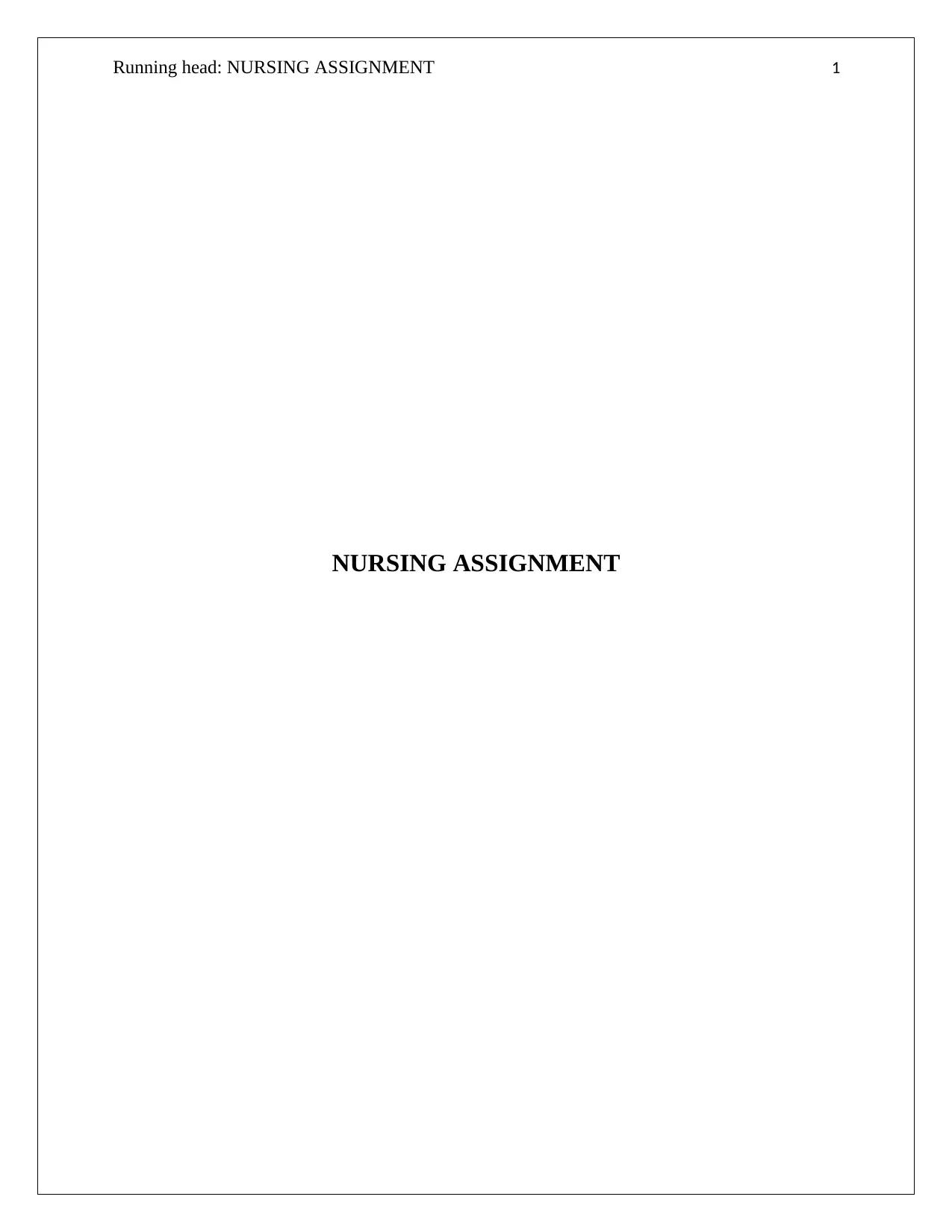
Running head: NURSING ASSIGNMENT 1
NURSING ASSIGNMENT
NURSING ASSIGNMENT
Paraphrase This Document
Need a fresh take? Get an instant paraphrase of this document with our AI Paraphraser
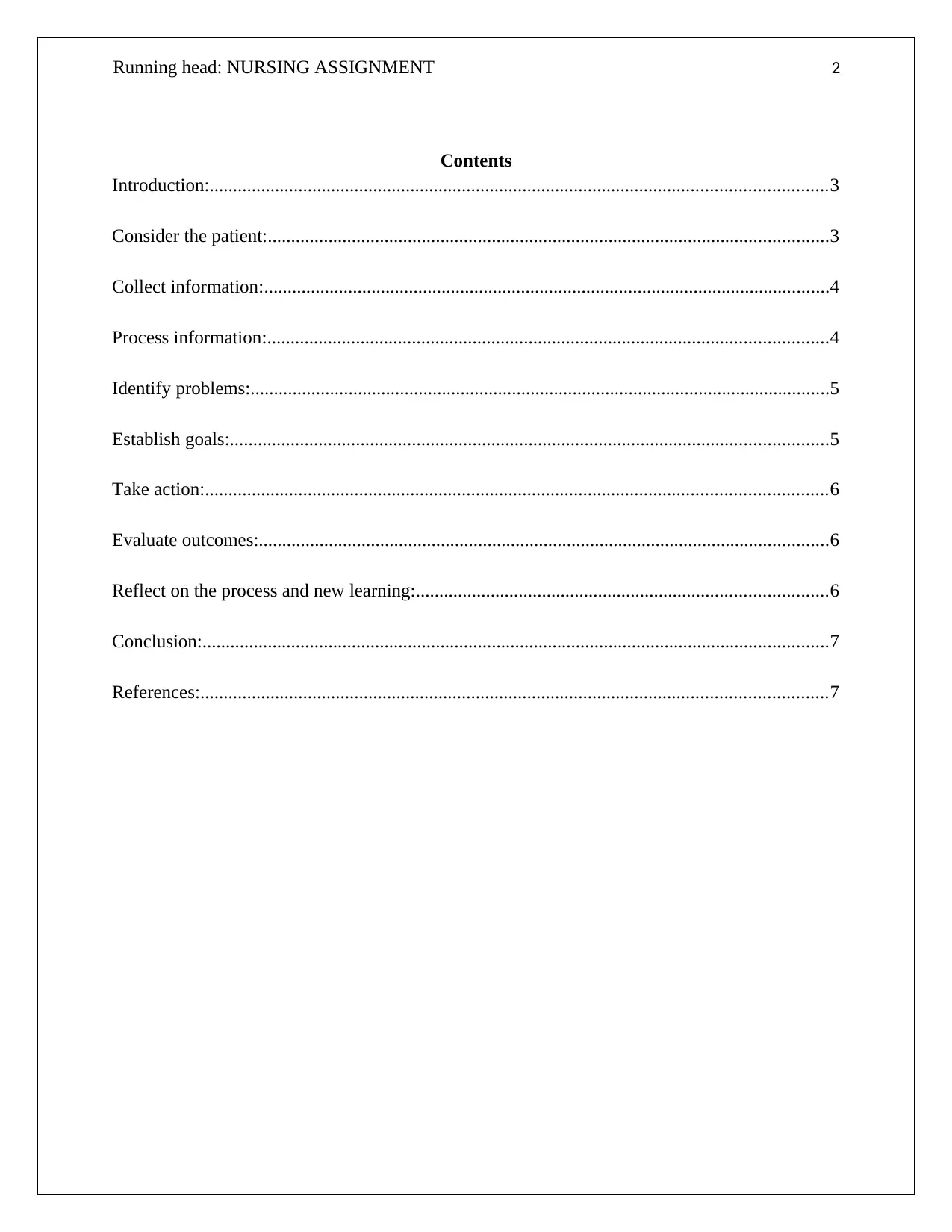
Running head: NURSING ASSIGNMENT 2
Contents
Introduction:....................................................................................................................................3
Consider the patient:........................................................................................................................3
Collect information:.........................................................................................................................4
Process information:........................................................................................................................4
Identify problems:............................................................................................................................5
Establish goals:................................................................................................................................5
Take action:.....................................................................................................................................6
Evaluate outcomes:..........................................................................................................................6
Reflect on the process and new learning:........................................................................................6
Conclusion:......................................................................................................................................7
References:......................................................................................................................................7
Contents
Introduction:....................................................................................................................................3
Consider the patient:........................................................................................................................3
Collect information:.........................................................................................................................4
Process information:........................................................................................................................4
Identify problems:............................................................................................................................5
Establish goals:................................................................................................................................5
Take action:.....................................................................................................................................6
Evaluate outcomes:..........................................................................................................................6
Reflect on the process and new learning:........................................................................................6
Conclusion:......................................................................................................................................7
References:......................................................................................................................................7
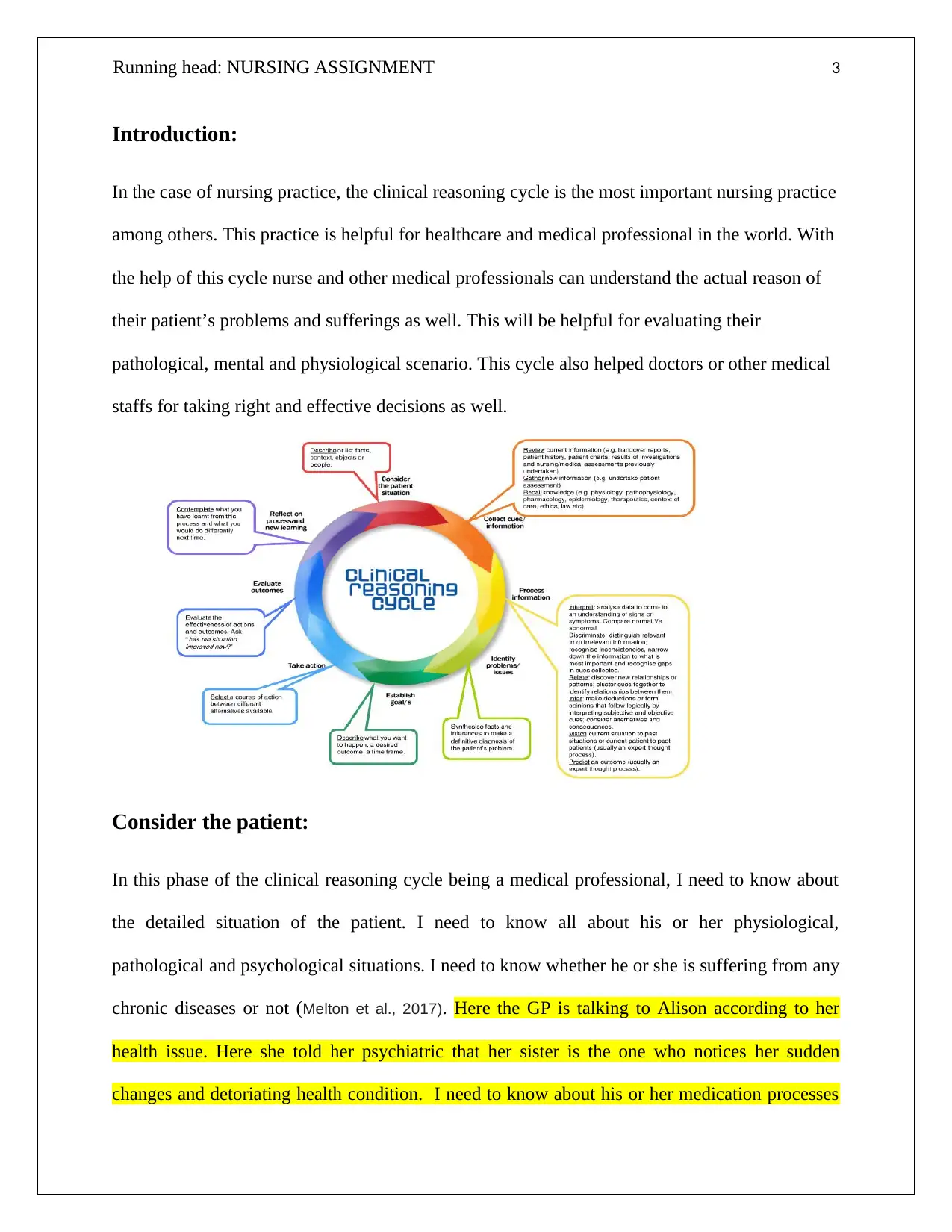
Running head: NURSING ASSIGNMENT 3
Introduction:
In the case of nursing practice, the clinical reasoning cycle is the most important nursing practice
among others. This practice is helpful for healthcare and medical professional in the world. With
the help of this cycle nurse and other medical professionals can understand the actual reason of
their patient’s problems and sufferings as well. This will be helpful for evaluating their
pathological, mental and physiological scenario. This cycle also helped doctors or other medical
staffs for taking right and effective decisions as well.
Consider the patient:
In this phase of the clinical reasoning cycle being a medical professional, I need to know about
the detailed situation of the patient. I need to know all about his or her physiological,
pathological and psychological situations. I need to know whether he or she is suffering from any
chronic diseases or not (Melton et al., 2017). Here the GP is talking to Alison according to her
health issue. Here she told her psychiatric that her sister is the one who notices her sudden
changes and detoriating health condition. I need to know about his or her medication processes
Introduction:
In the case of nursing practice, the clinical reasoning cycle is the most important nursing practice
among others. This practice is helpful for healthcare and medical professional in the world. With
the help of this cycle nurse and other medical professionals can understand the actual reason of
their patient’s problems and sufferings as well. This will be helpful for evaluating their
pathological, mental and physiological scenario. This cycle also helped doctors or other medical
staffs for taking right and effective decisions as well.
Consider the patient:
In this phase of the clinical reasoning cycle being a medical professional, I need to know about
the detailed situation of the patient. I need to know all about his or her physiological,
pathological and psychological situations. I need to know whether he or she is suffering from any
chronic diseases or not (Melton et al., 2017). Here the GP is talking to Alison according to her
health issue. Here she told her psychiatric that her sister is the one who notices her sudden
changes and detoriating health condition. I need to know about his or her medication processes
⊘ This is a preview!⊘
Do you want full access?
Subscribe today to unlock all pages.

Trusted by 1+ million students worldwide
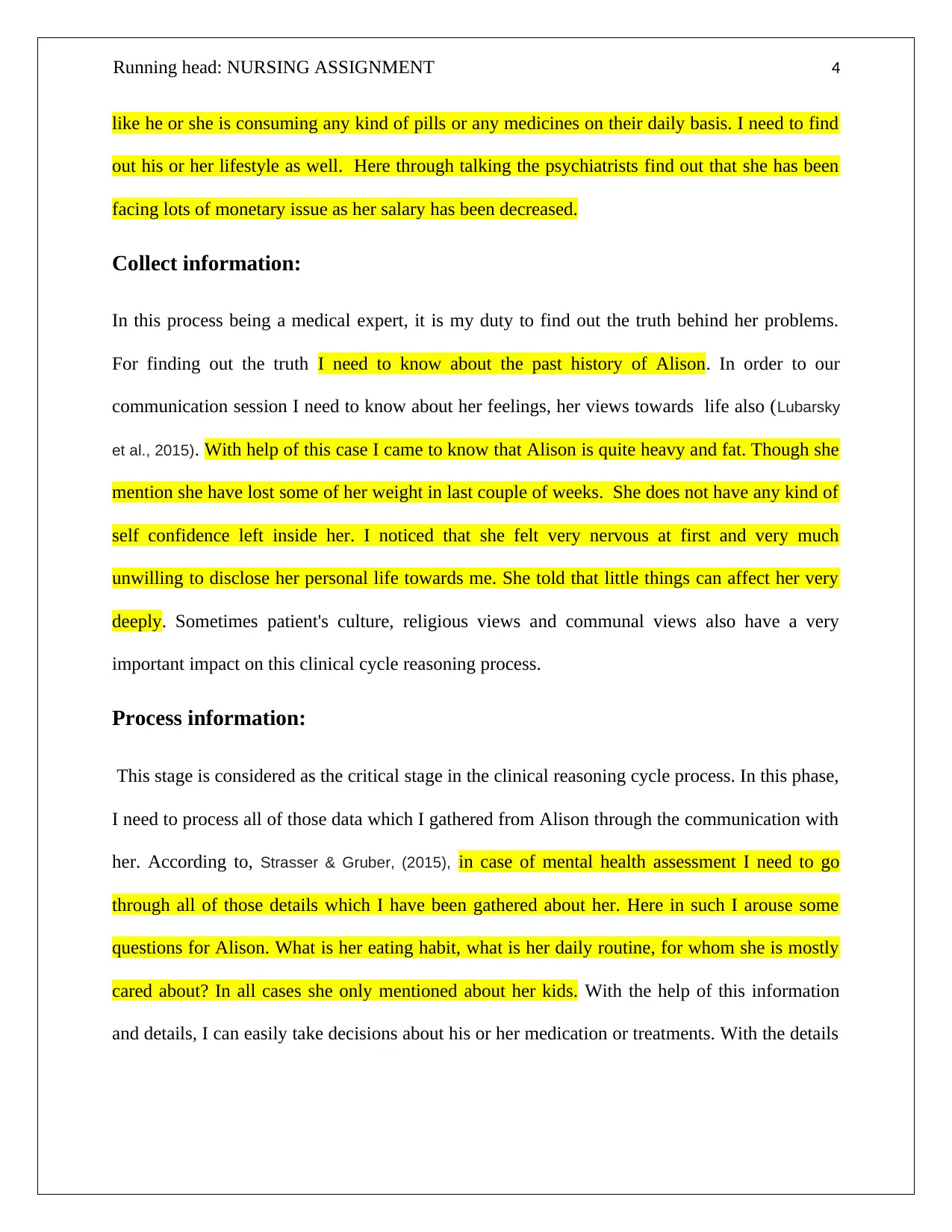
Running head: NURSING ASSIGNMENT 4
like he or she is consuming any kind of pills or any medicines on their daily basis. I need to find
out his or her lifestyle as well. Here through talking the psychiatrists find out that she has been
facing lots of monetary issue as her salary has been decreased.
Collect information:
In this process being a medical expert, it is my duty to find out the truth behind her problems.
For finding out the truth I need to know about the past history of Alison. In order to our
communication session I need to know about her feelings, her views towards life also (Lubarsky
et al., 2015). With help of this case I came to know that Alison is quite heavy and fat. Though she
mention she have lost some of her weight in last couple of weeks. She does not have any kind of
self confidence left inside her. I noticed that she felt very nervous at first and very much
unwilling to disclose her personal life towards me. She told that little things can affect her very
deeply. Sometimes patient's culture, religious views and communal views also have a very
important impact on this clinical cycle reasoning process.
Process information:
This stage is considered as the critical stage in the clinical reasoning cycle process. In this phase,
I need to process all of those data which I gathered from Alison through the communication with
her. According to, Strasser & Gruber, (2015), in case of mental health assessment I need to go
through all of those details which I have been gathered about her. Here in such I arouse some
questions for Alison. What is her eating habit, what is her daily routine, for whom she is mostly
cared about? In all cases she only mentioned about her kids. With the help of this information
and details, I can easily take decisions about his or her medication or treatments. With the details
like he or she is consuming any kind of pills or any medicines on their daily basis. I need to find
out his or her lifestyle as well. Here through talking the psychiatrists find out that she has been
facing lots of monetary issue as her salary has been decreased.
Collect information:
In this process being a medical expert, it is my duty to find out the truth behind her problems.
For finding out the truth I need to know about the past history of Alison. In order to our
communication session I need to know about her feelings, her views towards life also (Lubarsky
et al., 2015). With help of this case I came to know that Alison is quite heavy and fat. Though she
mention she have lost some of her weight in last couple of weeks. She does not have any kind of
self confidence left inside her. I noticed that she felt very nervous at first and very much
unwilling to disclose her personal life towards me. She told that little things can affect her very
deeply. Sometimes patient's culture, religious views and communal views also have a very
important impact on this clinical cycle reasoning process.
Process information:
This stage is considered as the critical stage in the clinical reasoning cycle process. In this phase,
I need to process all of those data which I gathered from Alison through the communication with
her. According to, Strasser & Gruber, (2015), in case of mental health assessment I need to go
through all of those details which I have been gathered about her. Here in such I arouse some
questions for Alison. What is her eating habit, what is her daily routine, for whom she is mostly
cared about? In all cases she only mentioned about her kids. With the help of this information
and details, I can easily take decisions about his or her medication or treatments. With the details
Paraphrase This Document
Need a fresh take? Get an instant paraphrase of this document with our AI Paraphraser
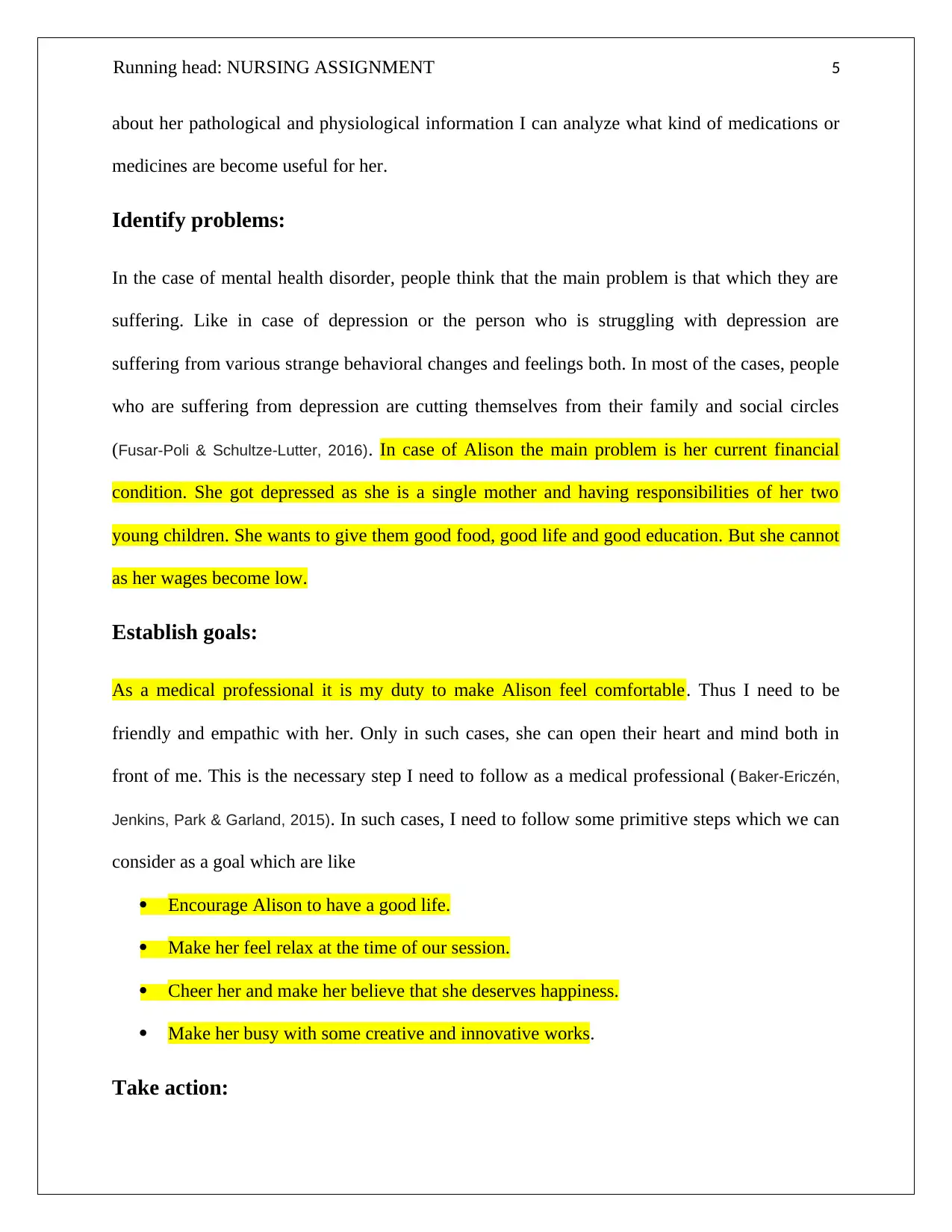
Running head: NURSING ASSIGNMENT 5
about her pathological and physiological information I can analyze what kind of medications or
medicines are become useful for her.
Identify problems:
In the case of mental health disorder, people think that the main problem is that which they are
suffering. Like in case of depression or the person who is struggling with depression are
suffering from various strange behavioral changes and feelings both. In most of the cases, people
who are suffering from depression are cutting themselves from their family and social circles
(Fusar-Poli & Schultze-Lutter, 2016). In case of Alison the main problem is her current financial
condition. She got depressed as she is a single mother and having responsibilities of her two
young children. She wants to give them good food, good life and good education. But she cannot
as her wages become low.
Establish goals:
As a medical professional it is my duty to make Alison feel comfortable. Thus I need to be
friendly and empathic with her. Only in such cases, she can open their heart and mind both in
front of me. This is the necessary step I need to follow as a medical professional (Baker-Ericzén,
Jenkins, Park & Garland, 2015). In such cases, I need to follow some primitive steps which we can
consider as a goal which are like
Encourage Alison to have a good life.
Make her feel relax at the time of our session.
Cheer her and make her believe that she deserves happiness.
Make her busy with some creative and innovative works.
Take action:
about her pathological and physiological information I can analyze what kind of medications or
medicines are become useful for her.
Identify problems:
In the case of mental health disorder, people think that the main problem is that which they are
suffering. Like in case of depression or the person who is struggling with depression are
suffering from various strange behavioral changes and feelings both. In most of the cases, people
who are suffering from depression are cutting themselves from their family and social circles
(Fusar-Poli & Schultze-Lutter, 2016). In case of Alison the main problem is her current financial
condition. She got depressed as she is a single mother and having responsibilities of her two
young children. She wants to give them good food, good life and good education. But she cannot
as her wages become low.
Establish goals:
As a medical professional it is my duty to make Alison feel comfortable. Thus I need to be
friendly and empathic with her. Only in such cases, she can open their heart and mind both in
front of me. This is the necessary step I need to follow as a medical professional (Baker-Ericzén,
Jenkins, Park & Garland, 2015). In such cases, I need to follow some primitive steps which we can
consider as a goal which are like
Encourage Alison to have a good life.
Make her feel relax at the time of our session.
Cheer her and make her believe that she deserves happiness.
Make her busy with some creative and innovative works.
Take action:
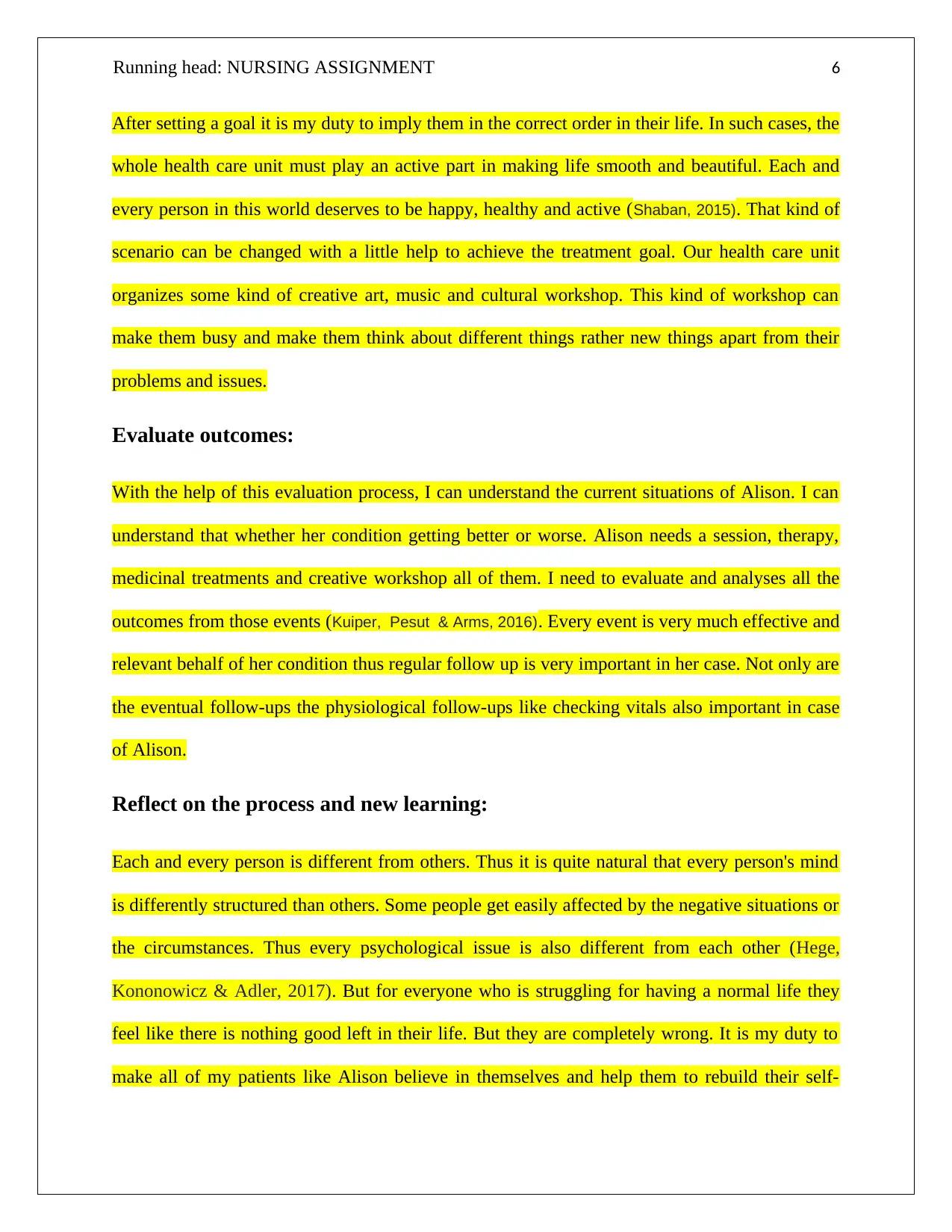
Running head: NURSING ASSIGNMENT 6
After setting a goal it is my duty to imply them in the correct order in their life. In such cases, the
whole health care unit must play an active part in making life smooth and beautiful. Each and
every person in this world deserves to be happy, healthy and active (Shaban, 2015). That kind of
scenario can be changed with a little help to achieve the treatment goal. Our health care unit
organizes some kind of creative art, music and cultural workshop. This kind of workshop can
make them busy and make them think about different things rather new things apart from their
problems and issues.
Evaluate outcomes:
With the help of this evaluation process, I can understand the current situations of Alison. I can
understand that whether her condition getting better or worse. Alison needs a session, therapy,
medicinal treatments and creative workshop all of them. I need to evaluate and analyses all the
outcomes from those events (Kuiper, Pesut & Arms, 2016). Every event is very much effective and
relevant behalf of her condition thus regular follow up is very important in her case. Not only are
the eventual follow-ups the physiological follow-ups like checking vitals also important in case
of Alison.
Reflect on the process and new learning:
Each and every person is different from others. Thus it is quite natural that every person's mind
is differently structured than others. Some people get easily affected by the negative situations or
the circumstances. Thus every psychological issue is also different from each other (Hege,
Kononowicz & Adler, 2017). But for everyone who is struggling for having a normal life they
feel like there is nothing good left in their life. But they are completely wrong. It is my duty to
make all of my patients like Alison believe in themselves and help them to rebuild their self-
After setting a goal it is my duty to imply them in the correct order in their life. In such cases, the
whole health care unit must play an active part in making life smooth and beautiful. Each and
every person in this world deserves to be happy, healthy and active (Shaban, 2015). That kind of
scenario can be changed with a little help to achieve the treatment goal. Our health care unit
organizes some kind of creative art, music and cultural workshop. This kind of workshop can
make them busy and make them think about different things rather new things apart from their
problems and issues.
Evaluate outcomes:
With the help of this evaluation process, I can understand the current situations of Alison. I can
understand that whether her condition getting better or worse. Alison needs a session, therapy,
medicinal treatments and creative workshop all of them. I need to evaluate and analyses all the
outcomes from those events (Kuiper, Pesut & Arms, 2016). Every event is very much effective and
relevant behalf of her condition thus regular follow up is very important in her case. Not only are
the eventual follow-ups the physiological follow-ups like checking vitals also important in case
of Alison.
Reflect on the process and new learning:
Each and every person is different from others. Thus it is quite natural that every person's mind
is differently structured than others. Some people get easily affected by the negative situations or
the circumstances. Thus every psychological issue is also different from each other (Hege,
Kononowicz & Adler, 2017). But for everyone who is struggling for having a normal life they
feel like there is nothing good left in their life. But they are completely wrong. It is my duty to
make all of my patients like Alison believe in themselves and help them to rebuild their self-
⊘ This is a preview!⊘
Do you want full access?
Subscribe today to unlock all pages.

Trusted by 1+ million students worldwide
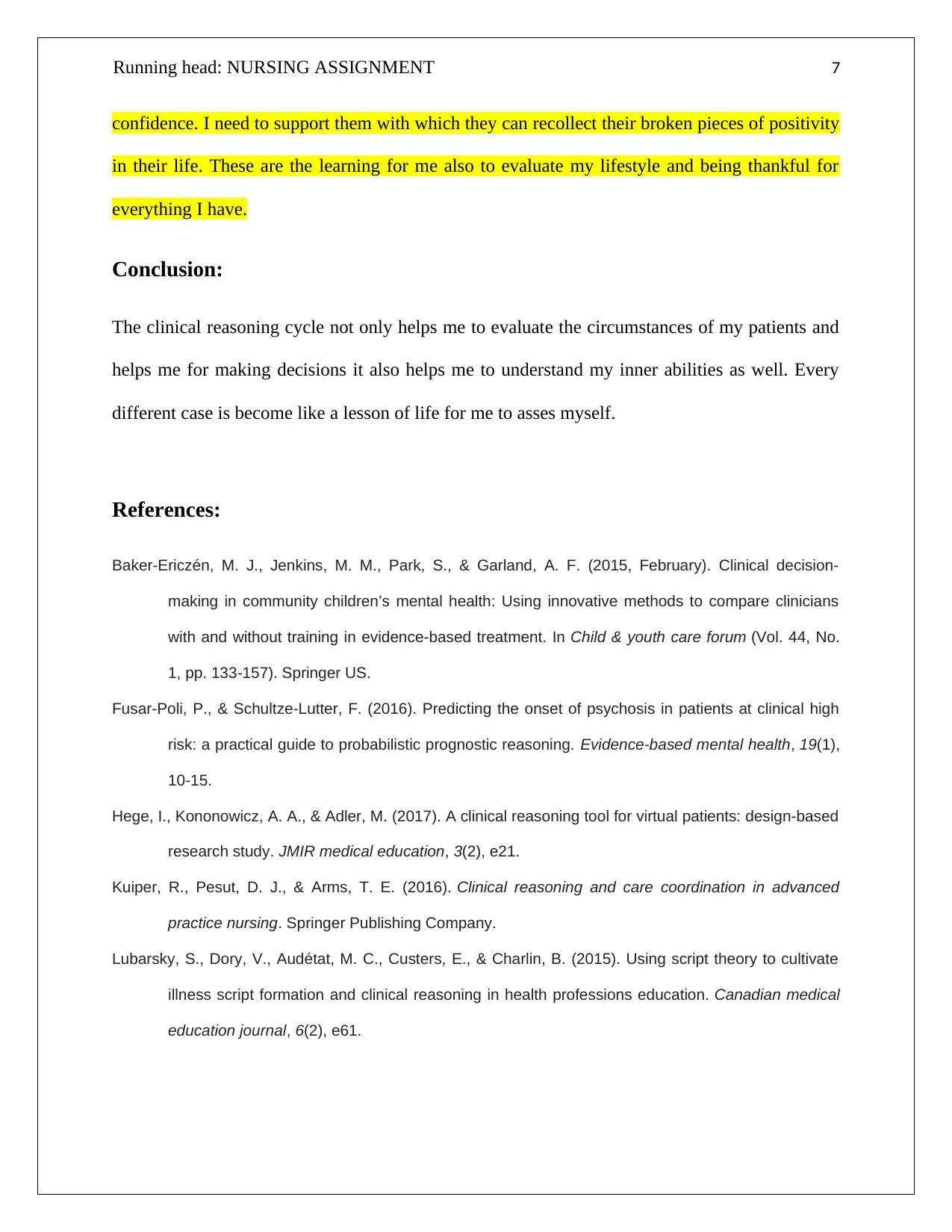
Running head: NURSING ASSIGNMENT 7
confidence. I need to support them with which they can recollect their broken pieces of positivity
in their life. These are the learning for me also to evaluate my lifestyle and being thankful for
everything I have.
Conclusion:
The clinical reasoning cycle not only helps me to evaluate the circumstances of my patients and
helps me for making decisions it also helps me to understand my inner abilities as well. Every
different case is become like a lesson of life for me to asses myself.
References:
Baker-Ericzén, M. J., Jenkins, M. M., Park, S., & Garland, A. F. (2015, February). Clinical decision-
making in community children’s mental health: Using innovative methods to compare clinicians
with and without training in evidence-based treatment. In Child & youth care forum (Vol. 44, No.
1, pp. 133-157). Springer US.
Fusar-Poli, P., & Schultze-Lutter, F. (2016). Predicting the onset of psychosis in patients at clinical high
risk: a practical guide to probabilistic prognostic reasoning. Evidence-based mental health, 19(1),
10-15.
Hege, I., Kononowicz, A. A., & Adler, M. (2017). A clinical reasoning tool for virtual patients: design-based
research study. JMIR medical education, 3(2), e21.
Kuiper, R., Pesut, D. J., & Arms, T. E. (2016). Clinical reasoning and care coordination in advanced
practice nursing. Springer Publishing Company.
Lubarsky, S., Dory, V., Audétat, M. C., Custers, E., & Charlin, B. (2015). Using script theory to cultivate
illness script formation and clinical reasoning in health professions education. Canadian medical
education journal, 6(2), e61.
confidence. I need to support them with which they can recollect their broken pieces of positivity
in their life. These are the learning for me also to evaluate my lifestyle and being thankful for
everything I have.
Conclusion:
The clinical reasoning cycle not only helps me to evaluate the circumstances of my patients and
helps me for making decisions it also helps me to understand my inner abilities as well. Every
different case is become like a lesson of life for me to asses myself.
References:
Baker-Ericzén, M. J., Jenkins, M. M., Park, S., & Garland, A. F. (2015, February). Clinical decision-
making in community children’s mental health: Using innovative methods to compare clinicians
with and without training in evidence-based treatment. In Child & youth care forum (Vol. 44, No.
1, pp. 133-157). Springer US.
Fusar-Poli, P., & Schultze-Lutter, F. (2016). Predicting the onset of psychosis in patients at clinical high
risk: a practical guide to probabilistic prognostic reasoning. Evidence-based mental health, 19(1),
10-15.
Hege, I., Kononowicz, A. A., & Adler, M. (2017). A clinical reasoning tool for virtual patients: design-based
research study. JMIR medical education, 3(2), e21.
Kuiper, R., Pesut, D. J., & Arms, T. E. (2016). Clinical reasoning and care coordination in advanced
practice nursing. Springer Publishing Company.
Lubarsky, S., Dory, V., Audétat, M. C., Custers, E., & Charlin, B. (2015). Using script theory to cultivate
illness script formation and clinical reasoning in health professions education. Canadian medical
education journal, 6(2), e61.
Paraphrase This Document
Need a fresh take? Get an instant paraphrase of this document with our AI Paraphraser
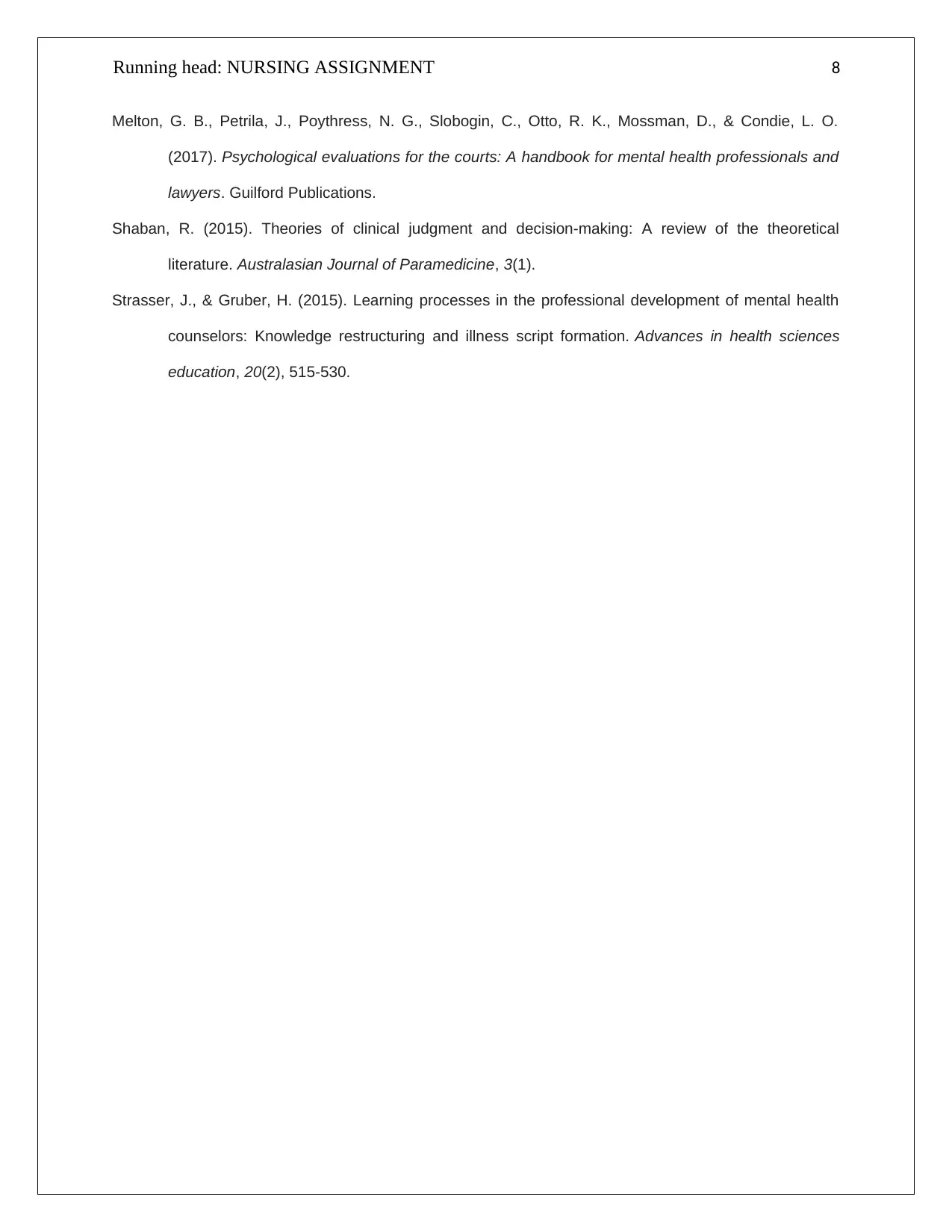
Running head: NURSING ASSIGNMENT 8
Melton, G. B., Petrila, J., Poythress, N. G., Slobogin, C., Otto, R. K., Mossman, D., & Condie, L. O.
(2017). Psychological evaluations for the courts: A handbook for mental health professionals and
lawyers. Guilford Publications.
Shaban, R. (2015). Theories of clinical judgment and decision-making: A review of the theoretical
literature. Australasian Journal of Paramedicine, 3(1).
Strasser, J., & Gruber, H. (2015). Learning processes in the professional development of mental health
counselors: Knowledge restructuring and illness script formation. Advances in health sciences
education, 20(2), 515-530.
Melton, G. B., Petrila, J., Poythress, N. G., Slobogin, C., Otto, R. K., Mossman, D., & Condie, L. O.
(2017). Psychological evaluations for the courts: A handbook for mental health professionals and
lawyers. Guilford Publications.
Shaban, R. (2015). Theories of clinical judgment and decision-making: A review of the theoretical
literature. Australasian Journal of Paramedicine, 3(1).
Strasser, J., & Gruber, H. (2015). Learning processes in the professional development of mental health
counselors: Knowledge restructuring and illness script formation. Advances in health sciences
education, 20(2), 515-530.
1 out of 8
Related Documents
Your All-in-One AI-Powered Toolkit for Academic Success.
+13062052269
info@desklib.com
Available 24*7 on WhatsApp / Email
![[object Object]](/_next/static/media/star-bottom.7253800d.svg)
Unlock your academic potential
Copyright © 2020–2026 A2Z Services. All Rights Reserved. Developed and managed by ZUCOL.





